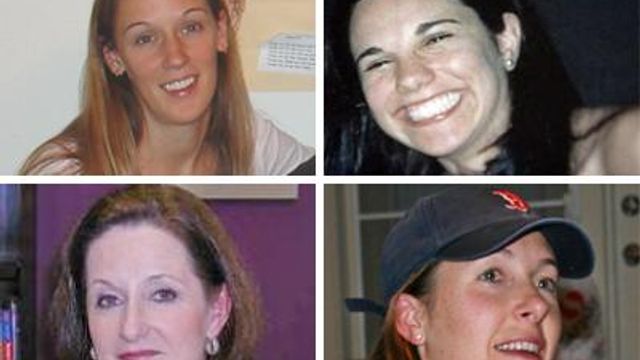Local News
Homicide cases pose challenges for investigators
Determining whether a case is domestic in nature is not as easy as it might seem. Four unsolved murder cases are examples of challenges investigators face.
Posted — UpdatedRALEIGH, N.C. — The U.S. Department of Justice reports that nearly a quarter of all murder victims nationwide are women – many of them mothers and many of them killed by men they knew.
North Carolina's murder rate for women ranks ninth in the U.S, according to the National Coalition Against Domestic Violence, and the majority of those victims were killed by an intimate partner.
Determining whether a case is domestic in nature is not as easy as it might seem, however. WRAL News found evidence of that in four high-profile unsolved murder cases that have captured headlines in recent years:
- Janet Abaroa, 25, was pregnant with her second child when someone stabbed her to death in the bedroom of her Durham home on April 26, 2005.
- Michelle Young, also pregnant with her second child, was found dead in her Wake County home on Nov. 3, 2006, beaten to death.
- The 10-year-old son of Rose Wynn, 53, a pastor's wife, found her beaten to death on the kitchen floor of her Raeford home on June 26.
- On July 14, Nancy Cooper, a Cary mother reported missing two days earlier, was found dead at a construction site not far from her home.
In each case, authorities have not treated the crime as random violence. While investigators have looked closely at the victims' husbands – Raven Abaroa, Jason Young, Rev. Sam Wynn and Brad Cooper – they have not made any arrests or officially named any suspects.
For the most part, the husbands have said little publicly about their wives' deaths. Recently, in a television interview, Raven Abaroa denied killing his wife. Brad Cooper spoke at one news conference before his wife's body was found, thanking the public for its efforts in trying to find his wife. Through his attorney, he has denied responsibility for her death.
Homicide investigators say they typically look at the people closest to victims and work to eliminate them as suspects before they look at other people.
"Any time you have a woman that is murdered, the statistics would say, frequently, the woman does know the person who has assaulted them, and oftentimes that is the spouse of the person," said Adam Hartzell, director of Interact of Wake County, a nonprofit agency that provides safety, support and awareness training to victims of domestic violence.
Already this year, husbands or boyfriends are accused of killing 57 women in North Carolina, according to the North Carolina Coalition Against Domestic Violence.
"The most dangerous time for a woman that's in a domestic violence situation – a woman or man that's in a domestic violence situation – is when they make that determination that they're going to leave," Hartzell said."
According to civil court documents, Nancy Cooper was in the process of legally separating from her husband. In affidavits, friends stated Brad Cooper was emotionally abusive, unfaithful, cut off his wife financially and restricted her contact with friends and family.
Rose Wynn and her husband were already separated at the time of her death and, according to a search warrant, were arguing over how to divide their assets.
Search warrants indicate Jason Young, was having an extramarital affair, and there were financial strains in the marriage.
Janet Abaroa and Raven Abaroa had reconciled after a separation before she was killed. Investigators say the couple was also having financial difficulties.
"In a domestic case, (investigators are) going to be looking at financial problems," defense attorney and former federal prosecutor Dan Boyce said. "They're going to be looking at infidelity or strife in the marriage. But that, in and of itself, doesn't prove the crime."
Boyce says domestic homicides can be especially difficult to clear because DNA evidence is often useless. Although DNA is used to solve many homicides, a spouse's DNA will naturally be found in the home and on the victim.
"There may be a very plausible reason for an individual's DNA to appear or a fingerprint to appear in the house, on the car, even on the body," Boyce said.
Boyce says that although investigators only need probable cause to make an arrest, prosecutors want a case that is ready to go to trial.
"They're looking at a much higher burden," he said. "'Can I prove this beyond a reasonable doubt in front of a jury?'"
For that reason, retired Raleigh police homicide investigator Chris Morgan had to wait more than four years to arrest Ann Miller Kontz in the December 2004 arsenic poisoning death of her husband, pediatric AIDS researcher Eric Miller.
"There's no do-overs, there is no 'We'll take a second chance on that,'" Morgan said.
Morgan says the time it takes to build such a case can be excruciating, but says he believes the cases of Wynn, Cooper, Young and Abaroa will ultimately be solved.
"Good investigators all around the world come in every day, whether it's a year, two years, 10 years down the road, and they say, 'I'm still going to solve this case,’" he said.
• Credits
Copyright 2024 by Capitol Broadcasting Company. All rights reserved. This material may not be published, broadcast, rewritten or redistributed.





